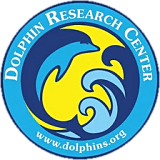Dolphin Research Center facts for kids
 |
|
| Date opened | 1984 |
|---|---|
| Location | Grassy Key, Florida, United States |
| Coordinates | 24°46′01″N 80°56′44″W / 24.76696°N 80.94552°W |
| No. of animals | 31 |
| No. of species | 3 |
| Memberships | AMMPA IMATA |
| Major exhibits | Dolphin lagoons, California sea lion lagoon |
The Dolphin Research Center (DRC) is a dolphinarium on Grassy Key, Florida. The 90,000-square-foot (8,400 m2) series of saltwater lagoons is home to several dolphins and California sea lions.
Contents
History
Fisherman Milton Santini opened Santini's Porpoise School in 1958, which he operated until 1972. Santini blasted lagoons into the seashore with dynamite to create deeper pens for the dolphins. One of Santini's dolphins, Mitzi, starred in the film Flipper. The property was sold and renamed as Flipper's Sea School in 1972 and operated under this name until 1977. At this point, it was purchased by Jean Paul Fortom-Gouin. Fortom-Gouin closed the property to the public, running it as the Institute for Delphinid Research until 1983. The Dolphin Research Center was founded in 1984 by Armando ("Mandy") and Jayne Rodriguez. Mandy had earlier been a dolphin trainer at Miami Seaquarium and decided to interact with dolphins in a manner less "circus-y".
Animals
As of 2018, DRC listed 26 dolphins as currently residing at its facilities. Twenty-five of the dolphins are bottlenose dolphins, while the other dolphin is an Atlantic spotted dolphin. Twenty-two of the dolphins were born in captivity, while one ("Rainbow") was captured from the wild. Two of the bottlenose dolphins and the Atlantic spotted dolphin were rescued from the wild. It is also home to four sea lions and several exotic birds.
Guest experience
Visitors to the DRC can pay to experience a variety of programs. In addition to the general admission price, guests can pay more to interact with dolphins in the water. DRC also has an "Ultimate Trainer for the Day" program where guests can shadow trainers and a "Researcher Experience" where they can shadow the DRC research team. Other guest experiences can include painting with a dolphin or providing enrichment.
Research
DRC staff members conduct and publish research on its captive dolphins. In a 2010 study "Blindfolded Imitation in a Bottlenose Dolphin (Tursiops truncatus)" and a follow-up 2013 study "Switching strategies: a dolphin’s use of passive and active acoustics to imitate motor actions", researchers tested the ability of a blindfolded dolphin to imitate the behavior of another dolphin or human. The blindfolded dolphin was able to replicate the behaviors of fellow dolphins by presumably recognizing the sound; when copying behaviors of a human in the water, it switched to using echolocation to ascertain the behavior being modeled.
In a 2018 publication "Bottlenose dolphins can understand their partner's role in a cooperative task" DRC staff tested the ability of bottlenose dolphins to coordinate their behavior to receive a reward. In a trial, pairs of dolphins were instructed to swim across their lagoons and press an underwater button, with each dolphin assigned a button. In some trials, both dolphins were given the command at the same time; in other trials, one dolphin would receive the command up to 20 seconds before the other. Trials were considered successful if the dolphins pressed the buttons at the same time (within one second). The dolphins learned to coordinate their actions, with the first dolphin to receive the command eventually waiting for the second dolphin to receive its command before acting. This demonstrated that dolphins are capable of coordinated action in pursuit of a common goal.
Education
The Center operated the College of Marine Mammal Professions. Formerly, students could earn an associate degree of science in Marine Mammal Behavior, Care and Training after completing a 36-week program. As of 2018, the associate degree program has been discontinued, and students can instead earn an "Occupational Associate's Degree" in Marine Mammal Behavior, Care, and Training through a similar 36-week program. The program is under their Training Institute.

